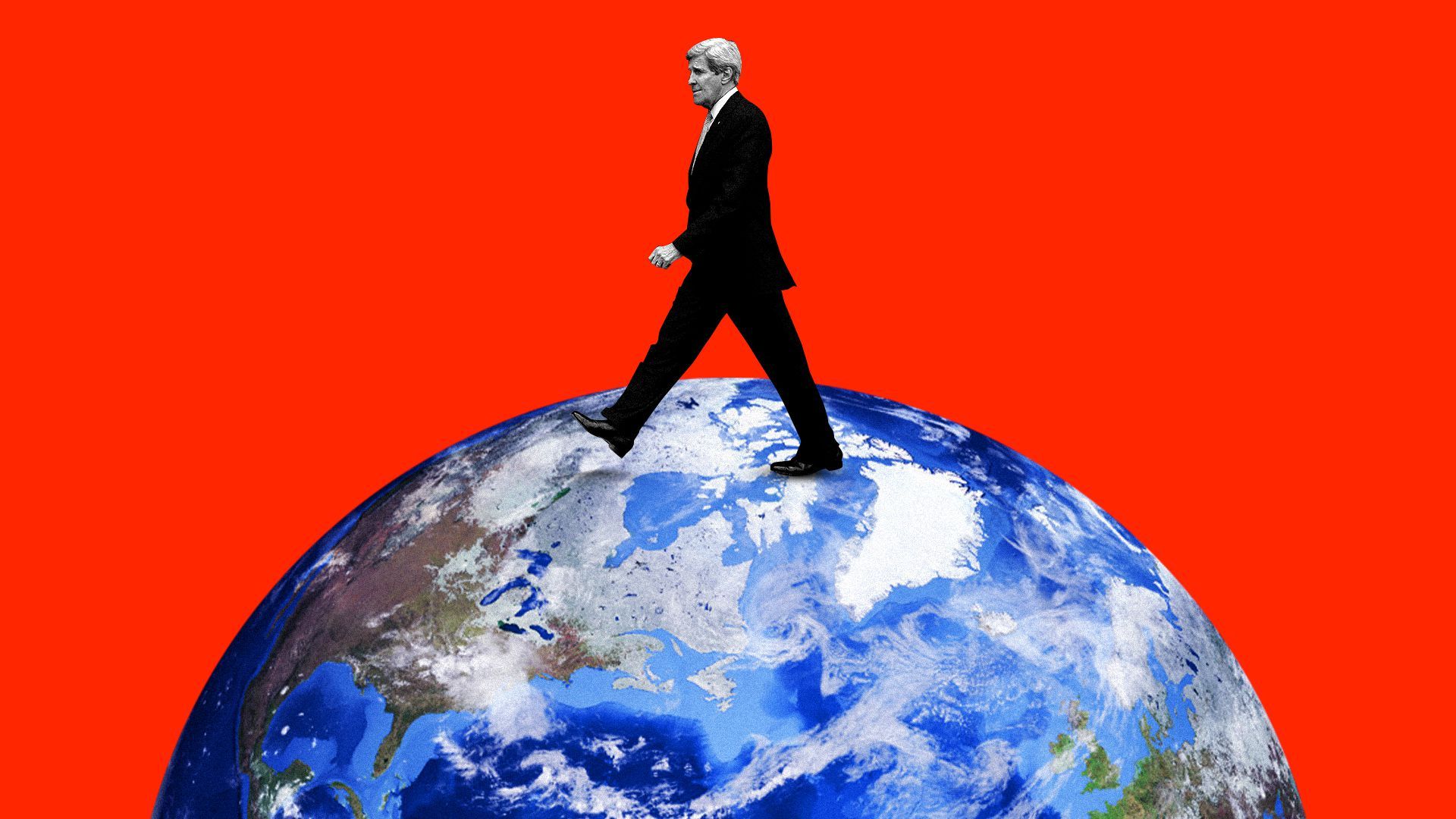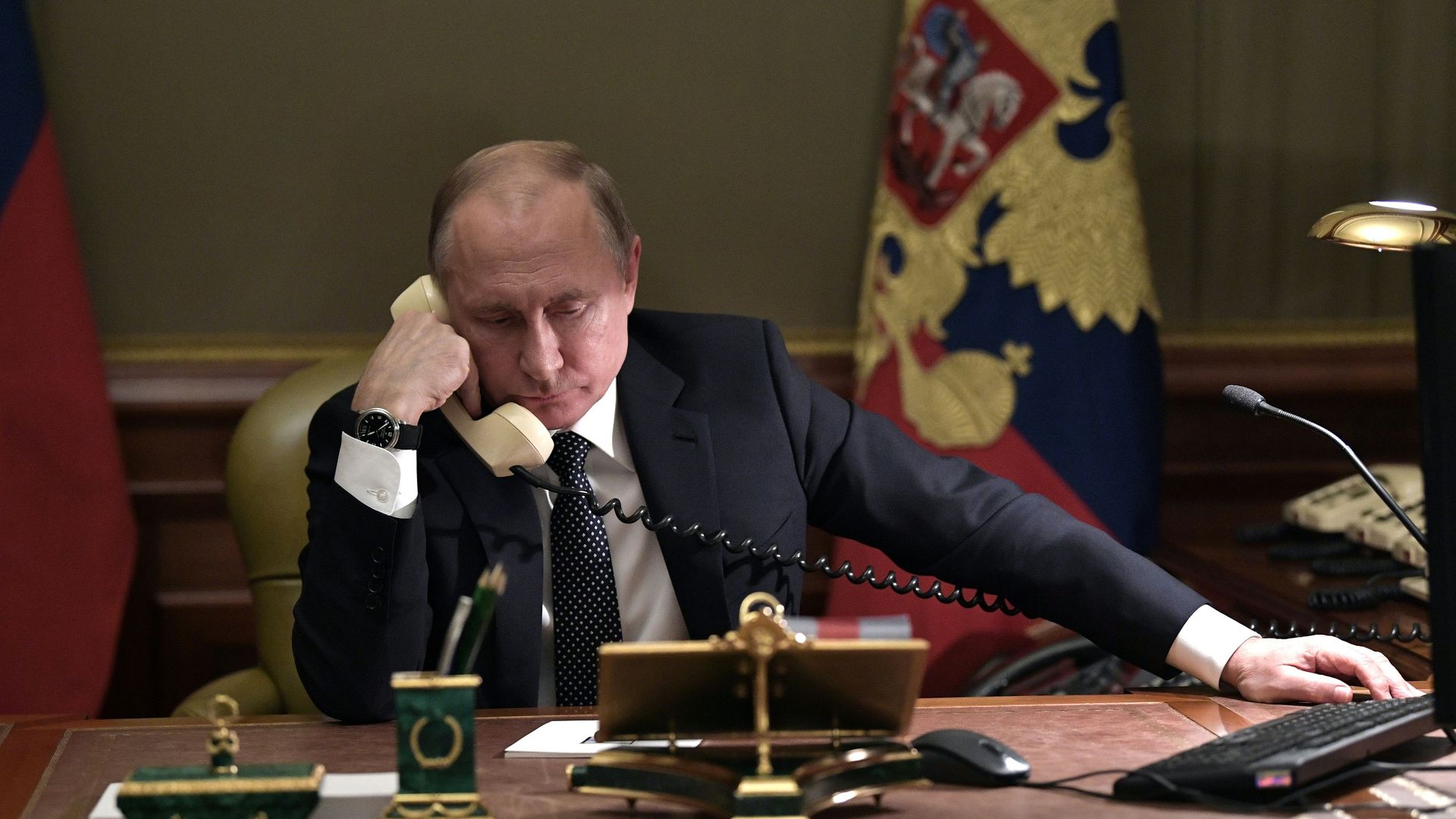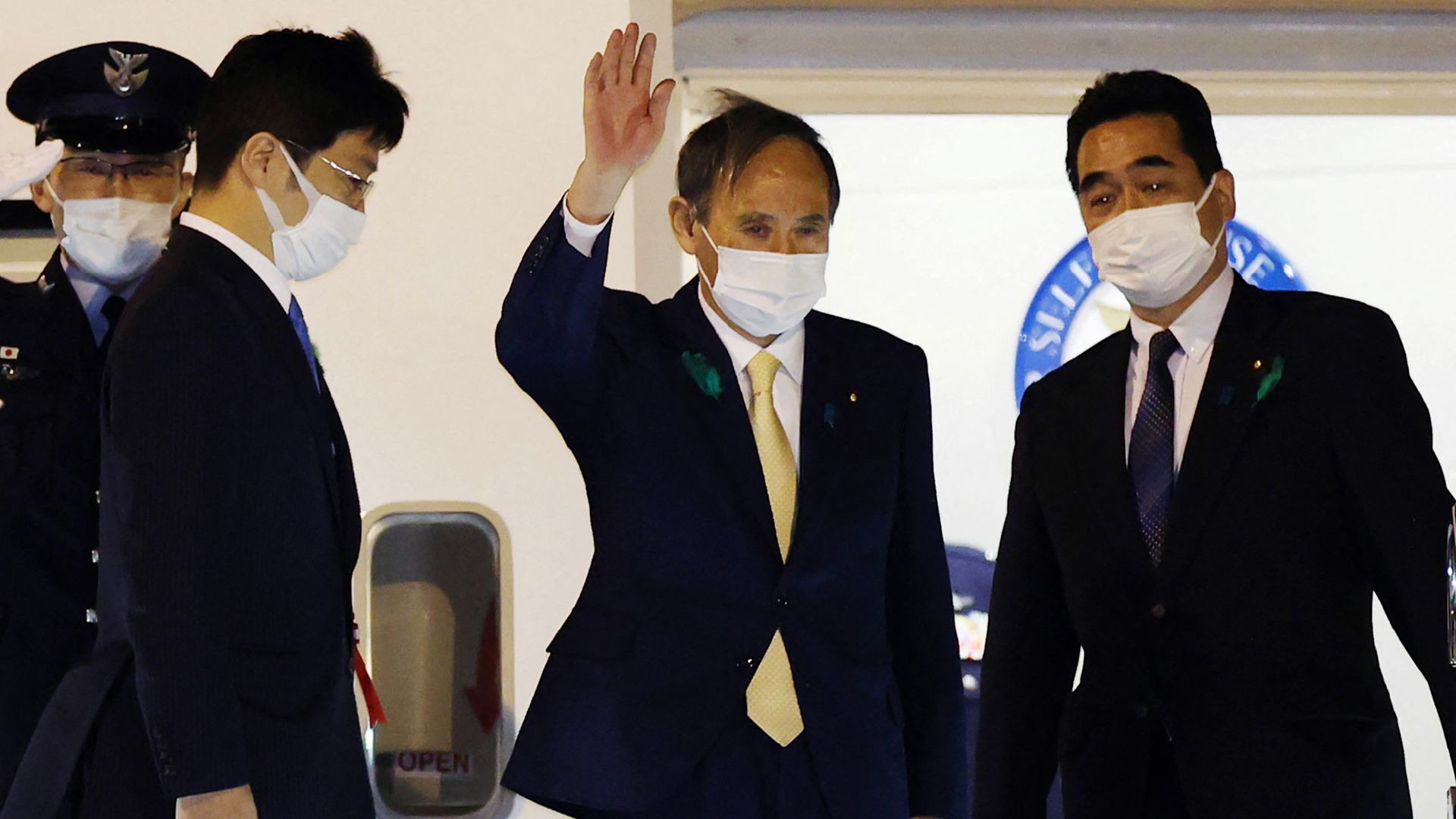| | | | | | | Presented By Blockchain.com | | | | Axios World | | By Dave Lawler ·Apr 15, 2021 | | Welcome back to Axios World. - We start tonight (1,597 words, 6 minutes) with Biden's globe-trotting climate envoy before getting trapped in this week's foreign policy whirlwind.
New arrival? Sign up. | | | | | | 1 big thing: Kerry goes to China |  | | | Illustration: Aïda Amer/Axios | | | | John Kerry became the first senior Biden administration official to touch down in China this week. He's also been the first to sit down with a string of world leaders. Why it matters: Kerry may no longer be secretary of state, but you'd be forgiven for thinking otherwise after a glance at his calendar. The unusual role could make Kerry a foreign policy force multiplier for President Biden, or potentially a source of mixed messages. Driving the news: As presidential climate envoy, Kerry has already met with Indian Prime Minister Narendra Modi, French President Emmanuel Macron, U.K. Prime Minister Boris Johnson, Bangladeshi Prime Minister Sheikh Hasina and UAE Crown Prince Mohammed bin Zayed, among other dignitaries. - While in New Delhi last week, he spoke with Russian Foreign Minister Sergey Lavrov, who was also visiting.
- That meeting fell as talks were beginning on the Iran nuclear deal, which Kerry and Lavrov helped negotiate in 2015, and as Russia was building up troops on Ukraine's border — though it's unclear if they discussed either topic.
- Kerry is expected to meet this week with multiple senior Chinese officials with portfolios extending far beyond climate.
- Still, he may be inclined to keep the focus narrow. Kerry has argued that coordination on climate change should be kept apart from tensions with Beijing on other issues.
The big picture: Kerry's itineraries reflect the fact that decisions on climate policy are ultimately made at the head of state level, notes Axios' climate reporter Andrew Freedman. They're also a sign of the high priority Biden is placing on the issue. - As he travels the world, Kerry's stature, relationships with many key global players, and close relationship with the president could prove major assets for Biden.
- But there's also room for confusion. A curious foreign diplomat recently asked me to explain where Kerry fell in the administration hierarchy and whether he got along with Secretary of State Tony Blinken.
Flashback: Blinken was Kerry's No. 2 when he led the State Department. - Now Kerry works downstairs in Foggy Bottom, and Blinken sits in Kerry's old office and flies on his former plane while serving as the new face of U.S. foreign policy.
- While Kerry was traveling to China, Blinken was in Brussels to coordinate with allies on the Afghanistan withdrawal and Russia-Ukraine tensions. Today, Blinken traveled to Kabul.
- Kerry, by contrast, travels light and often commercial. He hasn't weighed in on issues beyond his brief, and if there are any tensions between the two seasoned diplomats, they haven't spilled out into the open.
What to watch: Kerry wants to convince China, the world's top carbon emitter, to set more ambitious near-term climate targets. He's also hoping Chinese President Xi Jinping will agree to take part in the virtual climate summit Biden is hosting April 22–23. - Before arriving in Shanghai, Kerry told the WSJ that climate was a "free-standing issue," set apart from other priorities.
- That may be a difficult balancing act to pull off in practice — for the U.S. and China, and for Biden's high-profile climate envoy.
Go deeper: John Kerry and China's long road ahead on climate |     | | | | | | 2. Where the doses are coming from and going to |  Data: Airfinity (totals may not add up due to rounding); Chart: Andrew Witherspoon/Axios The world crossed a coronavirus vaccine milestone this week: Over 1 billion doses have now been produced. The big picture: Production continues to ramp up quickly. While it took several months to reach 1 billion doses, we should hit 2 billion by the end of May, according to data from Airfinity, a science information and analytics company. - China is the biggest producer and easily the biggest exporter, particularly now that India is curbing exports to fight a brutal second wave.
- Russia, Switzerland, South Korea, Brazil and South Africa are all producing doses, but they lag behind the five producers on our chart.
- The U.S. has kept nearly all of its supply for domestic use, but it expects to become a major exporter once domestic needs are met. The White House has offered few details on that front, though, beyond saying a framework for dose-sharing is in the works.
The U.S. has also administered the most doses to date with 23% of the global total, according to Our World in Data. - By the numbers: 21% of all vaccinations have been in China, 14% in India, 5% in the U.K. and 4% in Brazil. The continent of Africa has administered just 1.6% of the total.
Go deeper: J&J delays rollout in Europe amid U.S. pause |     | | | | | | 3. Biden's foreign policy whirlwind: Exiting Afghanistan | | Blinken (L) today with Afghan negotiator Abdullah Abdullah. Photo: Handout via Getty Blinken's unannounced trip to Kabul today was designed to assure the Afghan government that America's commitment to the country will outlast its troop presence. Why it matters: Biden has decided on a full withdrawal by Sept. 11, regardless of the conditions on the ground, not because he saw a clear path to a stable Afghanistan once American troops were gone, but because he felt it was clear after 20 years that no such path existed with them there. - Blinken fended off questions from Afghan and American reporters today about the prospect of a civil war, contending that such an outcome was "in no one's interest."
- Meanwhile, national security adviser Jake Sullivan rebutted concerns about intelligence gaps after the withdrawal, saying the U.S. would have "have months of warning" if al-Qaeda and ISIS were plotting attacks on the homeland from Afghanistan.
- The other side: David Petraeus, the former commander of U.S. troops in Afghanistan, warned of a potential Taliban offensive and a vacuum to be filled by terror groups. "Ending U.S. involvement in an endless war doesn't end the endless war. It just ends our involvement," he said.
Biden argued in Wednesday's speech that waiting for the "right moment" was "a recipe for keeping American troops in Afghanistan indefinitely." - "I know there are many who will loudly insist that diplomacy cannot succeed without a robust U.S. military presence to stand as leverage. We gave that argument a decade. It never proved effective," he said.
What to watch: Diplomacy may now have to wait for America to withdraw. The UN is attempting to organize a peace conference in Istanbul beginning on April 24, but a Taliban spokesperson said the group would boycott any such events until all U.S. troops are out of the country. |     | | | | | | A message from Blockchain.com | | Worried you missed the boat on Bitcoin? It's not too late | | |  | | | | Blockchain.com allows you to buy, sell, trade, swap and earn cryptocurrencies like Bitcoin. The background: With over 70M Wallets in 200 countries, Blockchain.com is trusted by millions of people to trade, store and use crypto. So, what are you waiting for? | | | | | | 4. Biden's foreign policy whirlwind: Punishing Putin |  | | | Photo: Alexey Nikolsky/AFP via Getty | | | | The Biden administration announced it will sanction dozens of Russian officials and entities, expel 10 diplomats from the U.S., and set new restrictions on buying Russian sovereign debt in response to the massive SolarWinds hack of federal agencies and interference in the 2020 election, Axios' Zach Basu and I write. Why it matters: The sweeping acts of retaliation are aimed at imposing heavy economic costs on Russia, after years of sanctions that have failed to deter an increasingly aggressive and authoritarian President Vladimir Putin. Details: American banks will be barred from the primary market for Russian government bonds beginning June 14. A senior administration official told reporters that would have a "broader chilling effect" on Russia's economy. - Thursday's announcements follow earlier sanctions over the jailing of opposition leader Alexei Navalny.
- But they did not cover bounties allegedly paid to the Taliban for killing U.S. troops. A senior administration official said U.S. intelligence had only "low to moderate confidence" such payments were made.
- The official noted that additional U.S. steps to respond to Russia's activities would "remain unseen."
Driving the news: The announcement comes two days after President Biden held a phone call with Putin and proposed a summit "in a third country in the coming months." - The senior official said it was unclear whether Putin would accept Biden's summit proposal, but that it was "vital" for the two to meet in the coming months "to find a stable and predictable way forward."
- "We have no desire to be in an escalatory cycle with Russia," the official said, while adding that the U.S. reserved the right to respond to any Russian reaction to Thursday's moves.
Worth noting: The retaliation over SolarWinds may seem hypocritical since the U.S. is itself highly active in cyber espionage. - A senior administration official said the attack crossed a line due to its "broad scope and scale," the danger of networks being degraded, and the fact that the burden fell largely on the private sector.
Go deeper |     | | | | | | 5. Biden's foreign policy whirlwind: Engaging Iran |  | | | A police officer stands guard outside of Vienna's Grand Hotel before the last round of talks. Photo: Joe Klamar/AFP via Getty | | | | The parties to the Iran nuclear deal left the first round of talks last week on a positive note, and they reunited today under storm clouds. The state of play: In response to an apparent Israeli attack on its Natanz nuclear site, Iran has vowed to accelerate its uranium enrichment to unprecedented levels. - The European signatories — France, Germany and the U.K. — condemned that announcement from Iran and warned that it would "complicate the diplomatic process."
- The U.S. has also criticized the announcement while distancing itself from the Natanz attack and calling for the talks to continue.
- The parties gathered in Vienna today in the same indirect format, with the U.S. communicating through intermediaries.
The latest: Russia's representative said today's talks had been positive, while China's said the top priority should now be "to do away with any disruptive factors and pick up the pace of negotiation." - But Iran's supreme leader appears more skeptical. He said the offers made thus far in Vienna were "not worth looking at."
|     | | | | | | 6. Coming attractions: Japan's PM visits D.C. |  | | | Suga departs for Washington. Photo: STR/JIJI Press/AFP via Getty | | | | Biden will tomorrow host his first foreign head of state, Japanese Prime Minister Yoshihide Suga. What to watch: The White House is pushing for a joint statement of support for Taiwan, per the FT. - Japan typically steers clear of such delicate issues in its relationship with China, but it's becoming harder to ignore.
- Beijing sent 25 warplanes into Taiwan's air defense zone on Monday, and it's warned that it will take control of the self-governing island by force if necessary.
- Biden sent a delegation of former officials to Taiwan this week as a show of support. That led to objections from Beijing, which always reacts furiously to such engagement with an island it considers part of its territory.
The bottom line: The meeting will be an early test of Biden's ambitions to bring together close U.S. allies, particularly in Asia, to confront China. |     | | | | | | 7. Stories we're watching |  | | | Gathering for prayers at the start of Ramadan, in Surabaya, Indonesia. Photo: Juni Kriswanto/AFP via Getty | | | - Senate considers sweeping bill to counter China
- Myanmar headed for "Syria-style conflict"
- Pentagon adds 500 troops in Germany
- Xinjiang statement removed from cotton watchdog website
- U.S. intelligence expects stormy year in Middle East
- Polish leader says U.S. must show democracy's resilience
- Japan to release Fukushima water into the sea
Quoted: "On my orders, the United States military has begun strikes against al-Qaeda terrorist training camps and military installations of the Taliban regime in Afghanistan." — George W. Bush, 7,130 days ago |     | | | | | | A message from Blockchain.com | | Worried you missed the boat on Bitcoin? It's not too late | | |  | | | | Blockchain.com allows you to buy, sell, trade, swap and earn cryptocurrencies like Bitcoin. The background: With over 70M Wallets in 200 countries, Blockchain.com is trusted by millions of people to trade, store and use crypto. So, what are you waiting for? | | | | | | Axios thanks our partners for supporting our newsletters.
Sponsorship has no influence on editorial content. Axios, 3100 Clarendon Blvd, Suite 1300, Arlington VA 22201 | | | You received this email because you signed up for newsletters from Axios.
Change your preferences or unsubscribe here. | | | Was this email forwarded to you?
Sign up now to get Axios in your inbox. | | | | Follow Axios on social media:    | | | | | |











No comments:
Post a Comment